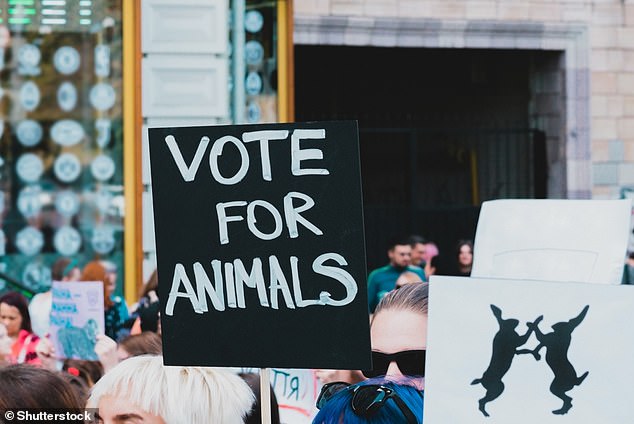Should animals be allowed to VOTE? Radical study claims critters should have a say on laws – but critics say the bizarre idea is laughable
Giving your dog its own ballot on the way to the polling station may sound like a bizarre scenario.
But one researcher claims it might not be a bad idea.
Ioan-Radu Motoarcă, professor of philosophy at Rowan University in New Jersey, believes that certain animals should have the right to vote.
In a new article he outlines his idea for a voting system that would allow critters to have their say on matters that concern them, such as the care of pets.
However, it seems not everyone agrees with this crazy idea, with one expert calling it ‘risky’.
Does your pet need to vote? A new study explains the logistics of an animal voting system (stock image)
In his article, Professor Motoarcă admits that ‘the idea that animals should have the right to vote sounds ridiculous’.
He continues: ‘Accordingly, most authors who have touched on the issue dismiss it in a few words as patently absurd.
‘I will argue, however, that we can understand this idea as a natural outcome of our fundamental democratic commitments.
‘That is why I believe that governments should recognize a political right to vote for at least certain categories of animals.’
Professor Motoarcă wants a voting system for animals in which appointed representatives – individual people or entire companies – cast votes on behalf of animals.
Under his proposed system, humans would only be appointed representatives to vote on behalf of animals when it comes to animal welfare.
This may include policies regarding livestock farming, meat production standards, fishing regulations or the care of pets.
Unconcerned with complex moral issues such as abortion or the legalization of prostitution, animals would not be required to vote on such issues.

Animal activists use their voices to raise awareness about the rights of other species – but what if these animals were allowed to have their own voices on issues that affect them? (file photo)
Professor Motoarcă makes comparisons with representatives acting on behalf of children or people with intellectual disabilities, ‘who need someone else to stand up for their rights’.
He also argues that the inability of animals to exercise voting rights is also not a valid reason to exclude them.
And while the idea may sound ridiculous, he claims it would be an extension of existing practices.
Certain governments already allow enforcement of animals’ legal rights through representatives.
In addition, many U.S. federal lawsuits name animals as plaintiffs—the one who files a lawsuit against another.
Historically, various governments have excluded certain categories – such as women and slaves – from having legal rights because this seemed justified at the time.
But all the commonly accepted reasons for blocking animal voting rights may seem just as archaic hundreds of years from now.
Professor Motoarcă’s idea is an example of the principle of ‘all interests involved’, whereby everyone affected by the decisions of a government should have the right to participate in that government.
This goes back at least to the Justinian Codex in Roman private law, which states that ‘what affects all must be approved by all’.
However, Thom Brooks, professor of law and governance at the University of Durham, told MailOnline that he disagrees with the new proposal.
“At a time when public confidence in our politics is anything but low, I believe that time and energy are best spent on ensuring that the voices of our fellow citizens are heard and that their votes are counted,” Professor Brooks said .
Matthew Kramer, professor of legal and political philosophy at the University of Cambridge, said it would be “risky” to give a non-human animal the right to vote.
More realistically, such a system would effectively entail the allocation of an additional vote to each human who votes on behalf of an animal.
“That human, and not the animal itself, is the party that would make a choice on whatever issue comes up at the ballot,” he told MailOnline.
However, Professor Kenneth Ehrenberg of the University of Sussex’s law school called it a ‘very interesting argument’ and not at all ‘ridiculous’.
‘Animals clearly feel pain and have interests – they can be better or worse off depending on the conditions they live in,’ he told MailOnline.
“It is not unreasonable to believe that they are advocates who would have an interest in the outcome of the election, as their lives could be improved or worsened by what happens in that election.
“The only remaining problem is that animals are unable to understand the options or what is at stake in the election.”
The new article has been published in the journal Analysis.

